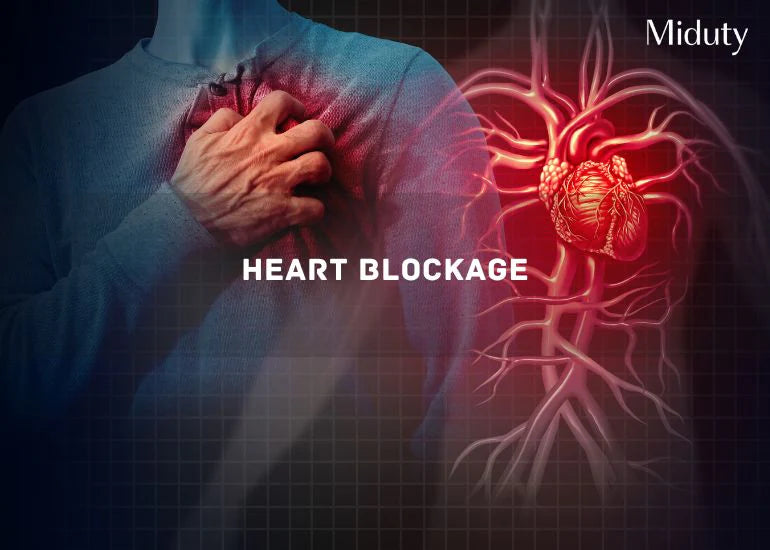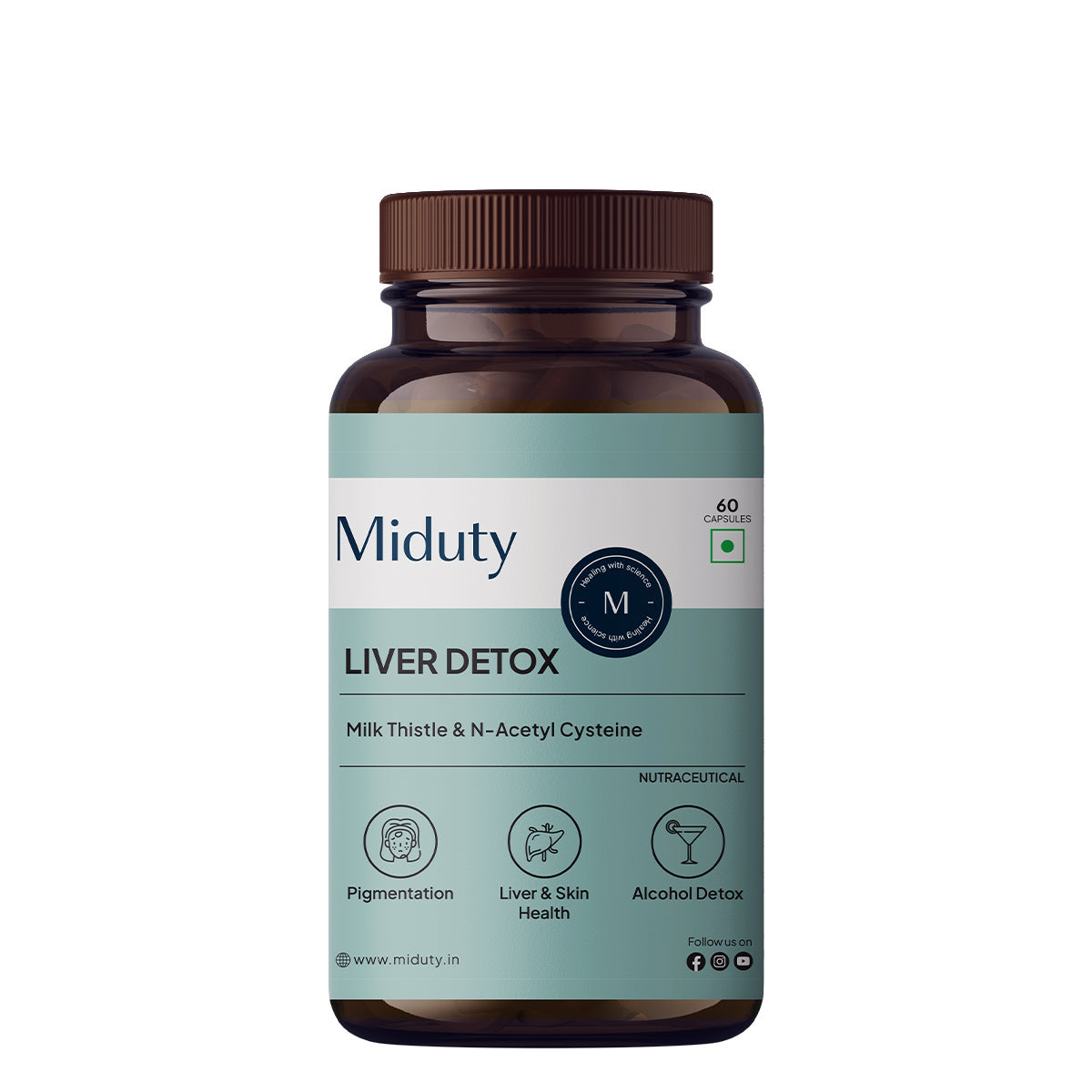
Heart Blockage
 Share
Share
Our heart is the first organ which starts to develop when we are in our mother’s womb.
From the 5th week of the pregnancy till our death our heart pumps blood continuously without a single skip. Therefore, it isn't wrong to say that our heart works 24/7 till our death.
Our heart is responsible to supply blood to every organ to our body, from our brain to feet.
And still we ignore the signs it gives to us, when it faces stress such as shortness of breath, chest pain or pressure in the lower chest, etc. Have you ever wondered if these signs could be an indication of heart blockage?
Now let's come to heart blockage. What is this heart blockage that we are listening to these days?
Before that, understand how the blood is being pumped by the heart. Our heart beats with an electrical signal, which transfers from the upper part of the heart to the lower heart, resulting in the pumping of blood.
Now when one faces heart blockage, this is because this electrical signal is disturbed and cannot be transferred properly. This is because of the deposition of fats in your arteries that are going to your heart.
This deposited fat is called plaque, which is responsible for reducing the space for the blood to flow in the artery. Resulting in less supply of blood to the heart and eventually heart blockage symptoms.
Heart Blockage Symptoms
Heart blockage symptoms can range from shortness of breath to varying degrees of chest pain. This type of chest pain is referred to as angina. It is usually followed by a sense of pressure or anxiety, and it might spread to the arms, back of the neck, back, upper abdomen, or jaw.

Grade Severity of Symptoms
Grade 1 - Chest pain only occurs in reaction to sudden physical or mental stress; it does not occur when performing simple daily tasks like walking or climbing stairs.
Grade 2 - Chest pain while climbing stairs, jogging or walking with speed, most probably after having a meal or in cold weather.
Grade 3 - Chest pain even when doing low-intensity physical activity, such as walking or changing clothes.
Grade 4 - Chest pain when at rest or even during the smallest amount of exercise.[1]
Symptoms of Heart Blockage in Females
As with men, women’s most common heart attack symptom is chest pain (angina) or discomfort.
Although some women have no symptoms, others may have
- Pain in the neck, jaw, or throat
- Pain in the upper abdomen or back
- Pain in one or both the arms
- Shortness of breath
Women may also have other symptoms, such as
- Nausea
- Vomiting
- Fatigue [2]
- Pressure or pain in the lower chest
- Dizziness
- lightheadedness or fainting [3]
Reason of Heart Blockage
As I have mentioned above, arteries are attached to the heart. Heart blockage occurs when these arterial walls get damaged or punctured and the LDL cholesterol (which is one type of the cholesterol) binds there in the similar way we apply seal to a water pipe.
Now when this LDL deposits in the arterial wall it decreases the passage for the blood and can result in blood clot.
Does that mean cholesterol or fat is bad for us? NO! Taking good cholesterol or HDL is very important as it removes the LDL or bad cholesterol from the arteries and carries it to the liver for the removal from the body.

We are always taught cholesterol is the actual problem, but that's not true. It's the inflammation of the arteries that is the actual reason for heart blockage.
Inflammation is the buildup of fatty deposits called plaque. Without inflammation, cholesterol can never be increased.
Heart Blockage Treatment without Surgery
When it comes to surgical treatment, your doctors will generally give medications- diuretics and statins or blood thinners, which have some major side effects. Let’s understand this!
Liver has a pathway which produces cholesterol, and cholesterol is responsible for making your hormones.
The prescribed blood thinners block this pathway causing you hormonal imbalance.
Same pathway produces CoQ10 which protects your heart, henceforth these medications block that as well.
And the diuretics that you take increases your urination frequency and urine quantity causing you the loss of magnesium and electrolytes such as potassium, which is an important requirement in high blood pressure and heart diseases.
I will tell you the Natural ways of adding blood thinners to your diet-
- Adding Omega 3 fatty acids- We need a minimum of 1.5 - 2 grams of omega 3 fatty acids per day. Which can be obtained from fish and other seafood, nuts and seeds (such as flaxseed, chia seeds, and walnuts), plant oils (such as flaxseed oil and canola oil). But, these cannot provide us the daily requirement of our body as these are hot foods and can lead to hot flashes and pimples.
Therefore, choosing an omega 3 supplement is the best option, that too with astaxanthin. Miduty Krill Omega Complex is the best choice for that as it has omega 3 with 2mg astaxanthin.
- Drinking water empty stomach- I start my day with 700ml of water which contains sea salt and lemon in it. This will help in flushing out all your toxins and starting your digestive system.
- Add potassium rich foods- The daily requirement for potassium in our body is 2.5-3.5mg for which you need to take 4-5 bowls of vegetables. It is important to maintain the Sodium- Potassium pump that is present in our cell system.
Because we cannot have 4-5 bowls of vegetables per day, you can take my Supergreen Powder, which I also take to balance my potassium requirement with 1 glass of vegetable juice.
- Consuming Garlic- Consuming garlic can lower cholesterol levels, high blood pressure, and low blood pressure. Additionally, garlic slows the development of heart diseases.
- Add Vit D and magnesium- Vitamin D is responsible in regulating the blood pressure, therefore its deficiency can lead to heart diseases or heart blockage. Hence, it is very important to maintain the vitamin D. [4] We cannot get Vitamin D from food, therefore it is always advisable to go for a supplement. Coco D3 is one such supplement, providing vitamin D and MCT oil which enhances your good cholesterol.
The magnesium is a vasodilator, that means it relaxes your vessels. Which further means it increases the area for the blood to pass through the vessels. Which will help you to get rid of heart and blood pressure related diseases. Apart from adding magnesium from your diet, you should always add a magnesium supplement. What could be the best combination than magnesium and CoQ10? Nothing, Right! Happy Heart is that combination. It is the best supplement in this case. [5]
References:
[1] https://www.ncbi.nlm.nih.gov/books/NBK355313/
[2] https://www.cdc.gov/heartdisease/women.htm
[4] https://www.ncbi.nlm.nih.gov/pmc/articles/PMC7770490/
[5] https://pubmed.ncbi.nlm.nih.gov/29793664/

